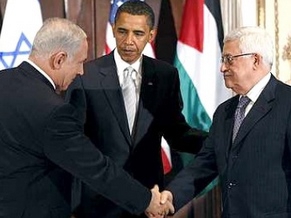|
World Jewish News

Benjamin Netanyahu, Barack Obama, and Mahmoud Abbas in New York in September 2009. Photo by: Reuters
|
Abbas resisting direct talks with Israel, despite Obama pressure
29.07.2010 Palestinian President Mahmoud Abbas is continuing to resist efforts to move to direct peace negotiations with Israel, despite a warning from the Obama administration that its assistance in establishing a future state was contingent upon such a development.
Abbas was in Cairo, ahead of an Arab League meeting to decide whether to add its weight to U.S. and Israeli pressure for face-to-face talks.
Abbas is under strong U.S. and European pressure to restart direct talks that were frozen in 2008. The U.S. has for the last few months been mediating indirect negotiations between the two sides, but the Palestinian leader said he would only move toward direct talks if Israel agrees to a complete halt in settlement construction and accepts a Palestinian state in territories seized in the 1967 Six Day War - the West Bank, Gaza and East Jerusalem.
"When I receive written assurances [about] accepting the 1967 border and halting the settlement [building], I will go immediately to the direct talks,"
Abbas was quoted as saying in remarks reported by Egypt's state-owned news agency Thursday.
Abbas said such assurances must come either directly from Prime
Minister Benjamin Netanyahu, or indirectly from a mediator – referring to the United States and the leaders of Egypt and Jordan.
Egypt said Wednesday it has received U.S. assurances that may help in restarting direct talks but refused to make the details public.
"I am under a kind of pressure I haven't been through all my life," Abbas said.
This week The Associated Press obtained a Palestinian document that revealed that U.S. peace envoy George Mitchell warned Abbas that if he does not agree to direct talks, President Barack Obama will not be able to help the Palestinians achieve a state of their own.
But the Palestinian president said he first wants to see progress in indirect talks that have been taking place since May under U.S. mediation. Specifically, he wants to see movement on the issue of borders for a future Palestinian state.
The internal Palestinian document warned Abbas that to give up on those demands would be political suicide.
Netanyahu, who has appealed for direct talks, has refused to be pinned down on a framework for negotiations. The Israeli prime minister has accepted the idea of Palestinian statehood with conditions but has ruled out giving up control of east Jerusalem, which the Palestinians want as their capital.
On settlements, Israel has instituted a 10-month slowdown in construction in areas the Palestinians want for a future state. That is due to expire in September and Netanyahu this week strongly indicated it would not be extended.
Asked what he would do if the indirect talks, which are also scheduled to end in September, bog down, Abbas said: "I will step down." As a joke, he added, "I will work as a reporter then."
The Arab League was to set out its position on direct talks on Thursday at a meeting of foreign ministers from 10 key League members in Cairo. A final decision would then be endorsed in September by all 22 foreign ministers from the bloc. That left open the possibility that strong objections from Abbas on Thursday could delay any decision.
Haaretz.com
|
|
